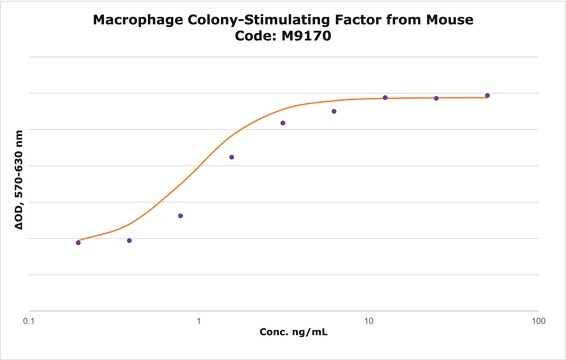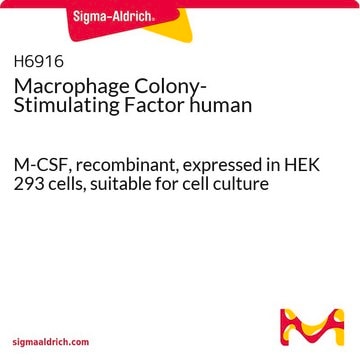G0792
Granulocyte-Macrophage Colony-Stimulating Factor from rat
>97% (SDS-PAGE), recombinant, expressed in E. coli, lyophililzed powder
Synonyme(s) :
GM-CSF
About This Item
Produits recommandés
product name
Granulocyte-Macrophage Colony-Stimulating Factor from rat, GM-CSF, recombinant, expressed in E. coli
Source biologique
rat
Niveau de qualité
Produit recombinant
expressed in E. coli
Pureté
>97% (SDS-PAGE)
Forme
lyophilized powder
Puissance
0.03-0.1 ng/mL
Qualité
endotoxin tested
Poids mol.
14.7 kDa
Conditionnement
pkg of 5X5 μg
pkg of 5 μg
Conditions de stockage
avoid repeated freeze/thaw cycles
Impuretés
<1 EU/μg
Numéro d'accès UniProt
Température de stockage
−20°C
Informations sur le gène
rat ... CSF2(116630) , Csf2(116630)
Vous recherchez des produits similaires ? Visite Guide de comparaison des produits
Actions biochimiques/physiologiques
Forme physique
Notes préparatoires
Remarque sur l'analyse
Produit comparable
Code de la classe de stockage
11 - Combustible Solids
Classe de danger pour l'eau (WGK)
WGK 3
Point d'éclair (°F)
Not applicable
Point d'éclair (°C)
Not applicable
Certificats d'analyse (COA)
Recherchez un Certificats d'analyse (COA) en saisissant le numéro de lot du produit. Les numéros de lot figurent sur l'étiquette du produit après les mots "Lot" ou "Batch".
Déjà en possession de ce produit ?
Retrouvez la documentation relative aux produits que vous avez récemment achetés dans la Bibliothèque de documents.
Notre équipe de scientifiques dispose d'une expérience dans tous les secteurs de la recherche, notamment en sciences de la vie, science des matériaux, synthèse chimique, chromatographie, analyse et dans de nombreux autres domaines..
Contacter notre Service technique







